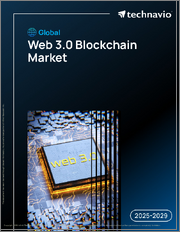
|
시장보고서
상품코드
1677355
블록체인 개발 아웃소싱 시장 : 블록체인 유형별, 서비스 유형별, 조직 규모별, 최종사용자별 - 예측(2025-2030년)Outsourcing Blockchain Development Market by Type Of Blockchain, Service Type, Organization Size, End Users - Global Forecast 2025-2030 |
||||||
블록체인 개발 아웃소싱 시장은 2024년 44억 9,000만 달러에서 2025년 59억 6,000만 달러에 이르고, 연평균 34.08% 성장하여 2030년에는 261억 달러에 달할 것으로 예상됩니다.
| 주요 시장 통계 | |
|---|---|
| 기준 연도 : 2024년 | 44억 9,000만 달러 |
| 추정 연도 : 2025년 | 59억 6,000만 달러 |
| 예측 연도 : 2030년 | 261억 달러 |
| CAGR(%) | 34.08% |
블록체인 기술은 전 세계 산업을 빠르게 재편하고, 안전하고 분산된 업무를 촉진하는 패러다임의 전환을 가져왔습니다. 블록체인 개발 아웃소싱은 대규모 내부 개발 부담 없이 혁신적인 솔루션을 활용하고자 하는 조직에게 전략적 움직임으로 부상하고 있습니다. 이러한 접근 방식은 숙련된 전문 지식에 대한 접근을 가능하게 하고, 프로젝트 타임라인을 단축하여 기업이 경쟁력을 유지할 수 있도록 돕습니다. 블록체인의 진화는 거래, 운영, 보안 프레임워크를 종합적으로 재검토하는 계기가 되었으며, 디지털화의 중요한 원동력이 되고 있습니다.
오늘날 조직은 외부 개발 파트너를 활용하여 견고할 뿐만 아니라 특정 산업 요구사항에 맞는 블록체인 솔루션을 통합하기 위해 외부 개발 파트너를 활용하는 경우가 증가하고 있습니다. 아웃소싱을 통해 기업은 위험을 최소화하고 예측 불가능한 시장 환경에서 솔루션을 확장하는 데 집중할 수 있습니다. 또한, 이러한 변화는 전 세계의 전문 지식이 모이는 역동적인 생태계를 만들어 모범 사례가 지속적으로 개선되고 실제 용도에 적용될 수 있도록 보장합니다. 의사결정권자들이 전략적 투자를 평가할 때 블록체인 개발 아웃소싱을 중시하는 것은 민첩한 혁신과 비용 효율성을 향한 필수적인 움직임을 반영합니다.
블록체인 도입 및 개발의 혁신적인 변화
블록체인을 둘러싼 환경은 급속한 기술 발전과 비즈니스 모델의 변화로 인해 혁신적인 변화를 맞이하고 있습니다. 블록체인의 탈중앙화 특성은 업계가 기존의 틀을 재검토하고 투명성, 효율성, 복원력을 우선시하는 시스템으로 전환하도록 유도하고 있습니다. 금융 부문에서 공공 거버넌스에 이르기까지, 블록체인 기술은 과거에는 복잡하고 실수하기 쉬운 것으로 여겨졌던 프로세스를 촉진하고 있습니다. 이러한 변화는 단순히 기술적인 것뿐만 아니라, 기업이 전략적 투자와 장기적인 성장을 바라보는 방식을 재정의하고 있습니다.
조직은 중요한 데이터를 보호하고, 거래를 간소화하고, 업무 효율성을 개선하기 위해 그 어느 때보다 블록체인을 도입하고 있습니다. 레거시 시스템이 디지털 수요를 따라잡기 위해 고군분투하는 가운데, 블록체인 프로젝트 아웃소싱 제공은 혁신과 실용성을 결합한 민첩한 대안을 제공합니다. 이러한 추세는 암호화 보안, 분산 원장 프로토콜, 상호운용성 아키텍처의 발전으로 뒷받침되고 있으며, 이 모든 것이 경쟁 시장에서 블록체인의 중요성이 증가하고 있음을 뒷받침하고 있습니다. 이러한 발전으로 기업들은 고객의 신뢰를 높이고, 변화하는 규제 환경과 시장의 압력에 적응할 수 있도록 설계된 탄력적인 시스템을 구축할 수 있는 좋은 위치에 있습니다.
변화의 여정은 블록체인의 접근성을 높이고 확장성을 높이는 점진적인 개선으로 특징지을 수 있습니다. 견고한 인프라 위에 구축된 진보적인 모델은 파일럿 프로젝트에서 얻은 학습과 함께 조직이 지속적으로 운영 청사진을 재검토하도록 유도하고 있습니다. 외부 파트너가 각자의 전문 기술과 산업 인사이트을 제공함으로써, 혁신은 개념적 혁신과 실제 적용을 연결하는 협업이 될 수 있습니다.
시장 세분화에 대한 주요 인사이트이 시장 발전를 촉진합니다.
블록체인 시장의 역동적인 특성은 전략과 실행 모두에 영향을 미치는 다양한 세분화 요인에 의해 주도되고 있습니다. 먼저, 블록체인 유형에 따라 시장을 분석하면 컨소시엄형, 하이브리드형, 프라이빗형, 퍼블릭형 블록체인으로 진화하는 것을 볼 수 있습니다. 각 카테고리는 프라이빗 환경의 고도의 보안부터 퍼블릭 네트워크에서 볼 수 있는 투명성과 탈중앙화까지 다양한 니즈에 대한 명확한 구현을 가능하게 합니다.
또한, 서비스 유형 구분은 매우 중요한 역할을 합니다. 실용적인 용도에서 기업은 블록체인 컨설팅 서비스, 배포 및 통합, 블록체인 아키텍처 설계, 지속적인 지원 및 유지보수, 품질 보증 및 테스트, 규제 준수 보장을 위한 블록체인 컨설팅 서비스를 찾고 있습니다. 이러한 제공 범위는 업무의 무결성을 유지하면서 맞춤형 구현을 지원하는 맞춤형 솔루션에 대한 니즈에 의해 개척되고 있습니다. 그 결과, 시장에는 특정 프로젝트 요구사항에 맞는 전문 서비스 모듈을 활용할 수 있는 기회가 넘쳐나고 있습니다.
기술적 세분화 외에도 조직의 규모도 시장 도입에 큰 영향을 미칩니다. 대기업의 미묘한 요구 사항과 중소기업의 요구 사항은 크게 다르며 각 부문은 고유 한 운영, 재무 및 전략 우선 순위를 나타냅니다. 마지막으로, 최종 사용자 관점에서 시장을 살펴보면 은행, 금융 서비스 및 보험, 교육, 엔터테인먼트 및 미디어, 정부 및 공공 부문, 의료, 제조, 석유 및 가스, 부동산, 소매 및 전자상거래 등 다양한 분야에서 활발한 수요가 있다는 것을 알 수 있습니다. 이러한 광범위한 영역은 블록체인 기술의 다재다능함과 그 적용 범위가 넓다는 것을 강조하며, 세분화를 통해 얻은 통찰력이 시장 전략의 지침이 될 뿐만 아니라 새로운 혁신의 길을 제시할 수 있도록 보장합니다.
목차
제1장 서문
제2장 조사 방법
제3장 주요 요약
제4장 시장 개요
제5장 시장 인사이트
- 시장 역학
- 성장 촉진요인
- 성장 억제요인
- 기회
- 과제
- 시장 세분화 분석
- Porter's Five Forces 분석
- PESTEL 분석
- 정치
- 경제
- 사회
- 기술
- 법률
- 환경
제6장 블록체인 개발 아웃소싱 시장 : 블록체인 유형별
- 컨소시엄 블록체인
- 하이브리드 블록체인
- 프라이빗 블록체인
- 퍼블릭 블록체인
제7장 블록체인 개발 아웃소싱 시장 : 서비스 유형별
- 블록체인 컨설팅 서비스
- 전개 및 통합
- 블록체인 아키텍처 설계
- 지속적 지원 및 유지관리
- 품질 보증 및ㄴ 테스트
- 규제 준수
제8장 블록체인 개발 아웃소싱 시장 : 조직 규모별
- 대기업
- 중소기업
제9장 블록체인 개발 아웃소싱 시장 : 최종사용자별
- 은행/금융서비스/보험(B
- 교육
- 엔터테인먼트 및 미디어
- 정부 및 공공 부문
- 헬스케어
- 제조업
- 석유 및 가스
- 부동산
- 소매업 및 전자상거래
제10장 아메리카의 블록체인 개발 아웃소싱 시장
- 아르헨티나
- 브라질
- 캐나다
- 멕시코
- 미국
제11장 아시아태평양의 블록체인 개발 아웃소싱 시장
- 호주
- 중국
- 인도
- 인도네시아
- 일본
- 말레이시아
- 필리핀
- 싱가포르
- 한국
- 대만
- 태국
- 베트남
제12장 유럽, 중동 및 아프리카의 블록체인 개발 아웃소싱 시장
- 덴마크
- 이집트
- 핀란드
- 프랑스
- 독일
- 이스라엘
- 이탈리아
- 네덜란드
- 나이지리아
- 노르웨이
- 폴란드
- 카타르
- 러시아
- 사우디아라비아
- 남아프리카공화국
- 스페인
- 스웨덴
- 스위스
- 터키
- 아랍에미리트(UAE)
- 영국
제13장 경쟁 구도
- 시장 점유율 분석, 2024
- FPNV 포지셔닝 매트릭스, 2024
- 경쟁 시나리오 분석
- 전략 분석과 제안
기업 리스트
- Altoros Systems, Inc.
- Boosty Labs
- ChainSafe Systems
- Consensys Software Inc.
- Debut Infotech
- Dirox Company Limited.
- Eleks
- HashCash Consultants
- Idealogic
- Labrys Group Pty Ltd.
- LeewayHertz
- OpenZeppelin
- Peikko Group Corporation
- Qubit Labs
- SoluLab Inc.
- Suffescom Solutions Inc
- SunTec Web Services Pvt. Ltd.
- Unicsoft
- ValueCoders Services LLP
The Outsourcing Blockchain Development Market was valued at USD 4.49 billion in 2024 and is projected to grow to USD 5.96 billion in 2025, with a CAGR of 34.08%, reaching USD 26.10 billion by 2030.
| KEY MARKET STATISTICS | |
|---|---|
| Base Year [2024] | USD 4.49 billion |
| Estimated Year [2025] | USD 5.96 billion |
| Forecast Year [2030] | USD 26.10 billion |
| CAGR (%) | 34.08% |
Blockchain technology has rapidly reshaped industries around the world, establishing a paradigm shift that drives secure and decentralized operations. Outsourcing blockchain development has emerged as a strategic move for organizations seeking to harness innovative solutions without bearing the burden of extensive internal development. This approach unlocks access to seasoned expertise and accelerates project timelines, enabling businesses to remain competitive. The evolution of blockchain has instigated a comprehensive rethinking of transactional, operational, and security frameworks, positioning it as a key enabler in digitization.
Organizations today are increasingly leveraging external development partners to integrate blockchain solutions that are not only robust but also tailored to specific industry requirements. By capitalizing on outsourcing, companies can minimize risk and focus on scaling solutions in an unpredictable market environment. Additionally, this shift creates a dynamic ecosystem where global expertise converges, ensuring that best practices are continuously refined and incorporated into real-world applications. As decision-makers evaluate strategic investments, the emphasis on outsourced blockchain development reflects an essential move towards agile innovation and cost effectiveness.
Transformative Shifts in Blockchain Adoption and Development
The blockchain landscape is undergoing transformative shifts, characterized by rapid technological evolution and changing business models. The decentralized nature of blockchain is prompting industries to reconsider traditional frameworks, moving towards systems that prioritize transparency, efficiency, and resilience. From financial sectors to public governance, blockchain technology is facilitating processes that were once considered cumbersome and prone to error. This shift is not merely technological but is also redefining how enterprises view strategic investments and long-term growth.
Organizations are now more than ever embracing blockchain to secure critical data, streamline transactions, and improve operational efficiencies. As legacy systems struggle to keep pace with digital demands, the outsourced delivery of blockchain projects offers an agile alternative that blends innovation with practicality. This trend is supported by advances in cryptographic security, distributed ledger protocols, and interoperability architectures-all of which underscore the increasing importance of blockchain within competitive markets. With these developments, enterprises are in a prime position to enhance customer trust and create resilient systems designed to adapt to evolving regulatory landscapes and market pressures.
The journey of transformation is also marked by incremental improvements that make blockchain both accessible and scalable. Progressive models built on robust infrastructure, combined with learnings from pilot projects, are continuously inspiring organizations to rethink their operational blueprints. As external partners contribute their specialized skills and industry insights, the transformation becomes a collaborative effort that bridges conceptual innovation with real-world application.
Key Segmentation Insights Driving Market Evolution
The dynamic nature of the blockchain market is driven by a variety of segmentation factors that influence both strategy and execution. First, when analyzing the market based on the type of blockchain, there is an observable evolution in consortium, hybrid, private, and public blockchains. Each of these categories enables distinct implementations that cater to varied needs ranging from heightened security in private environments to the transparency and decentralization found in public networks.
Furthermore, service type segmentation plays a pivotal role. In practical applications, firms are exploring blockchain consulting services, deployment and integration, designing blockchain architecture, ongoing support and maintenance, quality assurance and testing, and ensuring regulatory compliance. This spectrum of offerings is carved out by the need for tailored solutions that support bespoke implementations while safeguarding operational integrity. As a result, the market is replete with opportunities to harness specialized service modules that address specific project requirements.
In addition to technical segmentation, organizational size significantly impacts market adoption. The nuanced requirements of large enterprises differ starkly from those of small and medium enterprises, with each segment exhibiting unique operational, financial, and strategic priorities. Last, exploring the market through the prism of end users reveals a robust demand across sectors such as banking, financial services and insurance; education; entertainment and media; government and the public sector; healthcare; manufacturing; oil and gas; real estate; and retail and eCommerce. This expansive range highlights the versatility of blockchain technology and its far-reaching applications, ensuring that insights from segmentation not only guide market strategy but also uncover novel avenues for innovation.
Based on Type Of Blockchain, market is studied across Consortium Blockchain, Hybrid Blockchain, Private Blockchain, and Public Blockchain.
Based on Service Type, market is studied across Blockchain Consulting Services, Deployment & Integration, Designing Blockchain Architecture, Ongoing Support & Maintenance, Quality Assurance & Testing, and Regulatory Compliance.
Based on Organization Size, market is studied across Large Enterprises and Small & Medium Enterprises.
Based on End Users, market is studied across Banking, Financial Services, & Insurance, Education, Entertainment & Media, Government & Public Sector, Healthcare, Manufacturing, Oil & Gas, Real Estate, and Retail & eCommerce.
Regional Trends Shaping Global Blockchain Deployment
A comprehensive look at regional trends reveals that global adoption of blockchain technology is as varied as it is profound. In the Americas, robust digital infrastructures and mature regulatory environments have paved the way for widespread blockchain implementation. Innovation is spearheaded by initiatives that integrate multiple business functions, pushing forward new standards of transparency and trust within key industries.
Across Europe, the Middle East, and Africa, a blend of established economies and emerging markets is driving strategic experimentation with blockchain. These areas have adopted a proactive stance towards regulatory clarity while fostering an environment conducive to experimentation and iterative learning, thereby sparking innovation in both private and public sectors.
In the Asia-Pacific region, rapid advancements in technology and a considerable push towards digital transformation are unlocking unprecedented growth opportunities. This region is characterized by high investment in research and development, which is significantly contributing to the acceleration and scalability of blockchain applications. Each of these regions is uniquely positioned, ensuring that global deployment of blockchain solutions remains attuned to localized challenges, regulatory nuances, and market-specific demands.
Based on Region, market is studied across Americas, Asia-Pacific, and Europe, Middle East & Africa. The Americas is further studied across Argentina, Brazil, Canada, Mexico, and United States. The United States is further studied across California, Florida, Illinois, New York, Ohio, Pennsylvania, and Texas. The Asia-Pacific is further studied across Australia, China, India, Indonesia, Japan, Malaysia, Philippines, Singapore, South Korea, Taiwan, Thailand, and Vietnam. The Europe, Middle East & Africa is further studied across Denmark, Egypt, Finland, France, Germany, Israel, Italy, Netherlands, Nigeria, Norway, Poland, Qatar, Russia, Saudi Arabia, South Africa, Spain, Sweden, Switzerland, Turkey, United Arab Emirates, and United Kingdom.
Insights on Leading Companies in the Blockchain Space
A critical examination of the competitive landscape shows that several companies are spearheading innovation in blockchain development. Organizations like Altoros Systems, Inc. and Boosty Labs have showcased strong capabilities in navigating complex blockchain projects, leveraging deep technical expertise to deliver robust solutions across industries. Similarly, ChainSafe Systems and Consensys Software Inc. have established themselves as pioneers in creating secure and scalable blockchain architectures. These firms have fortified their positions by integrating advanced cryptographic protocols with agile project methodologies.
Other notable players include Debut Infotech and Dirox Company Limited., who have effectively harnessed the power of blockchain to transform legacy systems into dynamic digital infrastructures. Companies such as Eleks and HashCash Consultants have also demonstrated a commitment to continuous improvement by offering comprehensive services that encompass everything from initial consulting to long-term support and enhancements.
Firms like Idealogic and Labrys Group Pty Ltd. continue to influence market direction with innovative services that bridge theoretical constructs with practical applications. LeewayHertz and OpenZeppelin have been critical in setting industry benchmarks for quality assurance and regulatory adherence. Meanwhile, the contributions of Peikko Group Corporation, Qubit Labs, SoluLab Inc., Suffescom Solutions Inc, SunTec Web Services Pvt. Ltd., Unicsoft, and ValueCoders Services LLP underscore the collective drive toward building a resilient, future-ready blockchain ecosystem. This collective expertise is steadily shaping the future of outsourced blockchain development.
The report delves into recent significant developments in the Outsourcing Blockchain Development Market, highlighting leading vendors and their innovative profiles. These include Altoros Systems, Inc., Boosty Labs, ChainSafe Systems, Consensys Software Inc., Debut Infotech, Dirox Company Limited., Eleks, HashCash Consultants, Idealogic, Labrys Group Pty Ltd., LeewayHertz, OpenZeppelin, Peikko Group Corporation, Qubit Labs, SoluLab Inc., Suffescom Solutions Inc, SunTec Web Services Pvt. Ltd., Unicsoft, and ValueCoders Services LLP. Strategic Recommendations for Industry Leaders
Industry leaders are encouraged to embrace collaborative and flexible strategies that align with both current technological trends and the evolving needs of diverse markets. Companies should prioritize the development of agile partnerships that enhance technological integration while mitigating risk exposure associated with rapid digital transformation. It is essential to evaluate potential partners based on their technical acumen, industry experience, and proven track record in delivering scalable blockchain solutions.
Leaders must also invest in robust frameworks for continuous learning and feedback loops. By staying abreast of breakthroughs in cryptographic security and decentralized ledger technologies, organizations can better position themselves to navigate regulatory changes and competitive pressures. Emphasizing a clear understanding of segmented market needs-from the intricacies of various blockchain types to specialized service offerings, organizational size, and end-user requirements-will ensure that investment decisions are data-driven and strategically sound.
Lastly, fostering an innovation-centric culture that encourages experimentation and the adoption of emerging digital tools is critical. Leveraging predictive analytics and market intelligence will enable companies to anticipate trends rather than merely react to them. With a forward-thinking approach, industry leaders can drive better alignment between business objectives and technological initiatives, ultimately securing a competitive edge in a constantly evolving digital landscape.
Consolidated Perspective on the Outsourcing Blockchain Development Market
In summary, the outsourcing of blockchain development represents a crucial pivot for organizations seeking to remain competitive in today's fast-paced digital arena. Insights derived from comprehensive segment breakdowns and regional analyses reveal not only the vast potential of blockchain applications but also underscore the need for strategic partnerships and rigorous service standards. The convergence of innovative technologies, adept service providers, and dynamic market demands has created an ecosystem marked by collaboration and continuous improvement.
The sector is not only defined by its technological advancements but also by its ability to adapt to varying market needs. As companies explore outsourcing options, they must harness insights that detail the interplay between blockchain type, service classification, organizational scale, and end-user sectors. This balanced approach facilitates more refined decision-making processes, ensuring that implementation strategies are both agile and thoroughly informed by industry trends.
Ultimately, a well-structured, research-backed strategy will drive sustainable growth and operational efficiency. By consolidating market perspectives, organizations are empowered to strategically navigate the complexities of blockchain adoption and secure long-term competitive advantages.
Table of Contents
1. Preface
- 1.1. Objectives of the Study
- 1.2. Market Segmentation & Coverage
- 1.3. Years Considered for the Study
- 1.4. Currency & Pricing
- 1.5. Language
- 1.6. Stakeholders
2. Research Methodology
- 2.1. Define: Research Objective
- 2.2. Determine: Research Design
- 2.3. Prepare: Research Instrument
- 2.4. Collect: Data Source
- 2.5. Analyze: Data Interpretation
- 2.6. Formulate: Data Verification
- 2.7. Publish: Research Report
- 2.8. Repeat: Report Update
3. Executive Summary
4. Market Overview
5. Market Insights
- 5.1. Market Dynamics
- 5.1.1. Drivers
- 5.1.1.1. Growing demand for decentralized and secure data management
- 5.1.1.2. Increasing demand for enhanced data security transparency and immutable transaction records from enterprises
- 5.1.1.3. Rising need for secure and efficient supply chain management solutions
- 5.1.2. Restraints
- 5.1.2.1. Integration complexities associated with legacy systems and new blockchain solutions
- 5.1.3. Opportunities
- 5.1.3.1. Increasing investments in blockchain solutions for decentralized energy management systems
- 5.1.3.2. Innovations in blockchain technology to develop platforms for managing healthcare records
- 5.1.4. Challenges
- 5.1.4.1. Risk of privacy breaches and data security associated with outsourcing blockchain development
- 5.1.1. Drivers
- 5.2. Market Segmentation Analysis
- 5.2.1. Type Of Blockchain: Increasing preference for consortium blockchains owing to their semi-decentralized nature
- 5.2.2. End Users: Rising adoption of outsourcing blockchain development in the BFSI sector to enhance transactional security
- 5.3. Porter's Five Forces Analysis
- 5.3.1. Threat of New Entrants
- 5.3.2. Threat of Substitutes
- 5.3.3. Bargaining Power of Customers
- 5.3.4. Bargaining Power of Suppliers
- 5.3.5. Industry Rivalry
- 5.4. PESTLE Analysis
- 5.4.1. Political
- 5.4.2. Economic
- 5.4.3. Social
- 5.4.4. Technological
- 5.4.5. Legal
- 5.4.6. Environmental
6. Outsourcing Blockchain Development Market, by Type Of Blockchain
- 6.1. Introduction
- 6.2. Consortium Blockchain
- 6.3. Hybrid Blockchain
- 6.4. Private Blockchain
- 6.5. Public Blockchain
7. Outsourcing Blockchain Development Market, by Service Type
- 7.1. Introduction
- 7.2. Blockchain Consulting Services
- 7.3. Deployment & Integration
- 7.4. Designing Blockchain Architecture
- 7.5. Ongoing Support & Maintenance
- 7.6. Quality Assurance & Testing
- 7.7. Regulatory Compliance
8. Outsourcing Blockchain Development Market, by Organization Size
- 8.1. Introduction
- 8.2. Large Enterprises
- 8.3. Small & Medium Enterprises
9. Outsourcing Blockchain Development Market, by End Users
- 9.1. Introduction
- 9.2. Banking, Financial Services, & Insurance
- 9.3. Education
- 9.4. Entertainment & Media
- 9.5. Government & Public Sector
- 9.6. Healthcare
- 9.7. Manufacturing
- 9.8. Oil & Gas
- 9.9. Real Estate
- 9.10. Retail & eCommerce
10. Americas Outsourcing Blockchain Development Market
- 10.1. Introduction
- 10.2. Argentina
- 10.3. Brazil
- 10.4. Canada
- 10.5. Mexico
- 10.6. United States
11. Asia-Pacific Outsourcing Blockchain Development Market
- 11.1. Introduction
- 11.2. Australia
- 11.3. China
- 11.4. India
- 11.5. Indonesia
- 11.6. Japan
- 11.7. Malaysia
- 11.8. Philippines
- 11.9. Singapore
- 11.10. South Korea
- 11.11. Taiwan
- 11.12. Thailand
- 11.13. Vietnam
12. Europe, Middle East & Africa Outsourcing Blockchain Development Market
- 12.1. Introduction
- 12.2. Denmark
- 12.3. Egypt
- 12.4. Finland
- 12.5. France
- 12.6. Germany
- 12.7. Israel
- 12.8. Italy
- 12.9. Netherlands
- 12.10. Nigeria
- 12.11. Norway
- 12.12. Poland
- 12.13. Qatar
- 12.14. Russia
- 12.15. Saudi Arabia
- 12.16. South Africa
- 12.17. Spain
- 12.18. Sweden
- 12.19. Switzerland
- 12.20. Turkey
- 12.21. United Arab Emirates
- 12.22. United Kingdom
13. Competitive Landscape
- 13.1. Market Share Analysis, 2024
- 13.2. FPNV Positioning Matrix, 2024
- 13.3. Competitive Scenario Analysis
- 13.3.1. Nigeria's Central Bank affiliate, NIBSS, joins Zone's Blockchain Network
- 13.3.2. Unicsoft & Helpware forge strategic alliance to elevate global blockchain outsourcing
- 13.3.3. Deutsche Bank collaborates with major financial and Web3 innovators to develop a comprehensive roadmap for blockchain interoperability
- 13.4. Strategy Analysis & Recommendation
Companies Mentioned
- 1. Altoros Systems, Inc.
- 2. Boosty Labs
- 3. ChainSafe Systems
- 4. Consensys Software Inc.
- 5. Debut Infotech
- 6. Dirox Company Limited.
- 7. Eleks
- 8. HashCash Consultants
- 9. Idealogic
- 10. Labrys Group Pty Ltd.
- 11. LeewayHertz
- 12. OpenZeppelin
- 13. Peikko Group Corporation
- 14. Qubit Labs
- 15. SoluLab Inc.
- 16. Suffescom Solutions Inc
- 17. SunTec Web Services Pvt. Ltd.
- 18. Unicsoft
- 19. ValueCoders Services LLP



















